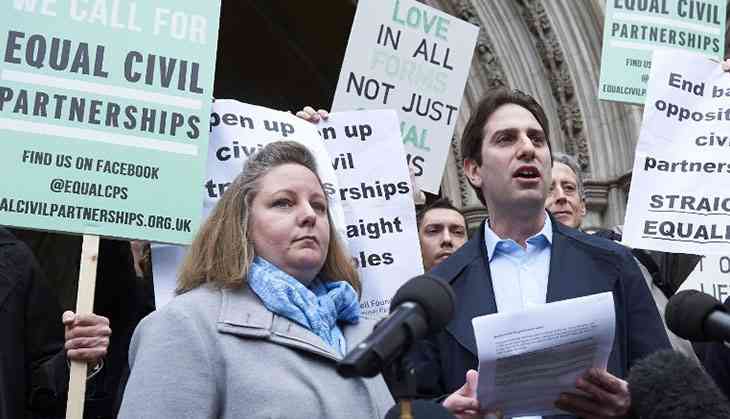Civil partnerships go mainstream as Supreme Court corrects a legal nonsense

The UK Supreme Court has ruled that civil partnerships should be available to heterosexual couples. The unanimous judgment marks the end of a long and hard-fought legal battle by Rebecca Steinfeld, Charles Keidan and their supporters, who argued that it was discriminatory to only allow same-sex couples to form civil partnerships.
The Supreme Court found that the government had discriminated against opposite-sex couples and breached the right to private and family life by offering different forms of recognition to opposite and same-sex couples. This corrects a bizarre legal anomaly that meant same-sex couples could choose between marriage or civil partnership, whereas for opposite-sex couples, marriage was the only form of legal recognition available. Soon – pending new legislation – heterosexual couples who don’t want to marry will very likely be able to form civil partnerships and secure legal recognition in key areas, not least inheritance, benefits, taxation and parental rights.
The ruling will also bring a new lease of life for civil partnerships themselves. Back in 2005, civil partnerships were introduced with much fanfare from government and great relief among many LGBTQ+ people, who, then unable to marry, could at last have their relationships recognised in law. But while civil partnerships were a welcome step forward, the legal rights they carried were so similar to marriage that it immediately became difficult to defend the exclusion of same-sex couples from marriage itself – arguably offering a more meaningful social status than civil partnership.
In 2014, the coalition government admitted the game was up and legislated for equal marriage in England and Wales. Parallel legislation was also passed in Scotland, though not in Northern Ireland.
Since then, marriage has been the preferred option for most same-sex couples seeking legal recognition in England and Wales – but a small number of new civil partnerships are still being registered. There has been some head-scratching within government, then, about what to do with civil partnerships.
Playing politics
A government statement in May sought to kick the issue into the long grass until at least 2020, concluding that research was needed before deciding the future of civil partnerships. But by correcting a legal nonsense that excluded opposite-sex couples from rights already enjoyed by same-sex couples, the Supreme Court ruling pushed the issue back into the spotlight.
The government should accept this ruling and legislate as soon as possible, and it could throw its weight behind a Private Member’s Bill on this issue currently going through parliament. But the path to actually passing new legislation will be rocky.
The prospect of offering heterosexual couples a legal alternative to marriage is unlikely to sit easily with many Conservative MPs and their supporters, who might read this as undermining a key social and legal institution. This was the reason David Cameron opposed granting civil partnerships to opposite-sex couples when he was prime minister.
Then there’s the awkward matter of parliamentary arithmetic. Since its disastrous performance in the election of June 2017, Theresa May’s government has relied on Northern Ireland’s Democratic Unionist Party (DUP) to retain a working majority in the House of Commons. Highly socially conservative by British standards, the DUP is unlikely to be enthusiastic about extending civil partnerships to straight couples.
Northern Ireland remains the only part of the UK and Ireland where same-sex couples cannot legally marry, and the Supreme Court’s judgment means it would surely be untenable for Northern Ireland to legislate for civil partnerships for straight couples without legalising same-sex marriage at the same time. To take any steps in this direction would therefore require a major shift in thinking for the DUP and its socially conservative base.
Role reversal
The Supreme Court ruling is a reminder that policy can bring about unintended consequences. Civil partnerships were introduced as a quick fix for a minority group. Although it was always clear this would lead to pressure for equal marriage, few imagined that LGBTQ+ couples would leapfrog their straight couples in being able to choose between marriage and civil partnership.
The idea that straight couples would one day be clamouring for civil partnerships as an alternative to marriage was not on the policy radar at all – and instead, for once, heterosexuals have been campaigning for rights already granted to LGBTQ+ people.
Of course, the government could respond to the judgment by abolishing civil partnerships altogether. That would be perverse, since it would force people already in civil partnerships to convert their partnerships to marriages. Instead, the government should bite the bullet and learn from experience elsewhere.
![]() Close to home, the Isle of Man has legislated for civil partnerships for same and different-sex couples alike, and family life there has not yet descended into anarchy as a result. In other countries where straight couples have access to an alternative to marriage, such as the Netherlands, most choose marriage as the preferred form of legal and social recognition. So if civil partnership is the legal status that refuses to die, there’s still quite a bit of life left in marriage as well.
Close to home, the Isle of Man has legislated for civil partnerships for same and different-sex couples alike, and family life there has not yet descended into anarchy as a result. In other countries where straight couples have access to an alternative to marriage, such as the Netherlands, most choose marriage as the preferred form of legal and social recognition. So if civil partnership is the legal status that refuses to die, there’s still quite a bit of life left in marriage as well.
Mike Thomas, Lecturer in Social Work, Brunel University London
This article was originally published on The Conversation. Read the original article.
First published: 28 June 2018, 14:32 IST
